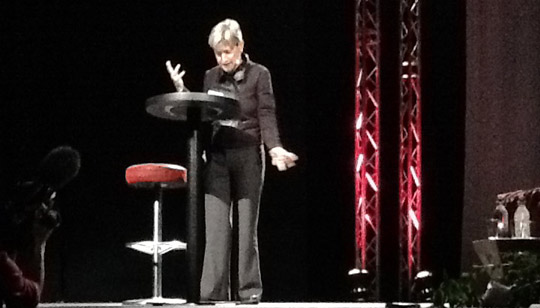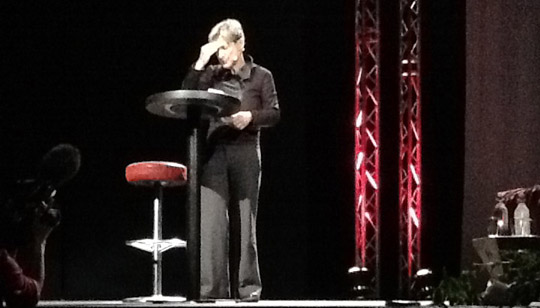I confess: I thought the most interesting thing about Judith Butler’s Gender Trouble was the cover. My edition had an old sepia-toned picture of two children—“the [something] sisters.” One has a boy’s haircut, and looks very unhappy. The other stands sweetly beside her. I found it so much more eloquent than the book itself, which seemed to me denser than a loaf of pumpernickel bread, denser than a steel ingot, denser than a white dwarf star. I don’t think I made it through the preface. If I did, it made the same kind of sense to me as reading À la recherche du temps perdu backwards, in French, while drunk. That is to say: the occasional glimmers of understanding felt fabulous, but it was all so ephemeral.
So when Judith Butler, together with fellow feminist theorist Rosi Braidotti on Monday evening in Oslo, met two members of Russian punk band Pussy Riot for a talk about politics, art and feminism, I was not expecting fireworks. Except for Pussy Riot, of course, who spoke through a balaclava and a voice distorter the last time I saw them. This time, they had ditched the disguises and spoke only through a translator. But I’m getting ahead of myself. And ahead of Judith Butler.
Chateau Neuf, the Oslo University students’ arts stage, is a place I’ve heard referred to ten thousand times, but, until Monday, had never visited. It was so shockingly ugly it was difficult to find: suffice it to say that if I sent you to a strange city and let you wander around a metro stop until you found “Chateau Neuf,” the building to which the name belonged is not the first, third or tenth place you would have guessed.
Built of concrete in the “brutalist” style, it was crawling with hip young student-y people dressed in stripes, scarves and distressed leather. I was dressed like they were but felt like I stuck out, betrayed by my uncertain body language. And then I suddenly realized something and felt completely amazed.
What suddenly struck me, standing at the center of Oslo students’ cultural life, was what they had all had compared to what I had as an undergraduate, studying in Norway’s second city of Bergen as I did. They had a direct and natural connection to the institutions running Norway simply by being in Oslo: internships and summer jobs in the media and government, parents who worked at those same institutions. And international academic superstars like Judith Butler came to their universities and cultural centers to lecture to them.
“Only just now realizing how peripheral we were in Bergen. It didn’t feel that way then” I texted my cousin K., who studied with me in Bergen. Like me, she studied there not because she wanted to, but because it simply didn’t occur to us to go anywhere but to the local college. A minute passed, then my phone beeped just before they let us into the venue.
“It really didn’t. Her er Og eit midpunkt.”
K. was quoting Olav H. Hauge, the apple-farming zen poet of Ulvik, a village on Norway’s west coast. The poem K. referred to to talks about shooting arrows at a target, and realizing that an arrow outside the bull’s-eye is also at a center, at its own center. “Here, too, is a center-point.”
I kept thinking of what she had said as I found a spot to sit. Ostensibly covering the symposium for GlobalPost, I took diligent notes and waited to hear someone criticize Russia or sanctions or say something newsily insightful about Ukraine so I could write about it. No dice, and by the time Braidotti reached the stage, my notes had devolved into koans.
“Feminism and nomadism
Praxis, something to be worked on
Desire for transformation
Playing with the faces of power”
Butler, seated directly behind me, laughed and laughed when Braidotti said, offhand, that Diana, princess of Wales, never died: she’s on Mars with Elvis. And then it was Butler’s turn, and before my eyes, the dry theoretician revealed herself as a transcendent speaker whose presence struck me as powerfully compassionate. I was simultaneously transfixed and unable to take notes on the content because I didn’t want to miss anything.

Suddenly her dense words made sense. Her presence, her voice and her body language when communicating, was the key I had been missing. I found myself thinking of the time I was walking outside the Pompidou art museum in Paris and came upon a street artist whose act was balancing matchsticks on spectators’ heads. He placed them one by one, on the ground, in complex patterns of stars, and people were invited to try to stand up the matchsticks on their own. Naturally, it was impossible. They weren’t trick matchsticks, the man had some secret way of standing them on their heads, some supernatural personal magnetism.
The applause, when she finished, was thunderous. I felt both elated, and slightly cheated, remembering the hours I had spent struggling with Butler’s impenetrable texts, only to discover now that the fault was not that I was too stupid to get it (though that may have been a contributing factor). No, with Butler, the unique experience of understanding something better was communicated verbally, in person, rather than strictly through text.

A lifelong bookworm, and a person who tends to communicate my most intimate feelings in writing to the people I love, rather than by speaking to them, I found the whole thing a novel experience. Bergen, where I grew up, is a small city compared to any capital city and provided just a few cultural outlets. Concerts and art exhibitions were occasional, not everyday, and certainly not taken for granted.
But I had excellent access to books in both English and Norwegian, so perhaps because of that, my earliest and most powerful cultural experiences came through reading. Reading was richer than the real world. I’d skip meals to keep reading, because what was happening in the book was so much more exciting than what was going on outside it. Even today, when I’m reading something great, actually experiencing something similar in the real world doesn’t always measure up. (For instance, reading Jeanette Winterson’s description of drinking coffee in Venice was nearly better than actually doing it myself.)
If that’s your understanding of how the world works, it doesn’t matter where you are in the world. Wherever you are with your book is also a center-point. This was my mentality as I studied in Bergen, feeling myself on equal footing with any Oslo student sitting with the same book.
But at your own center-point with your book, it turns out there are some things you may be missing. Your perspective is not actually perfect, and objective. Some things can only be experienced at another center-point, one of geography, access, and experience. And Judith Butler, it turns out, is one of them.

